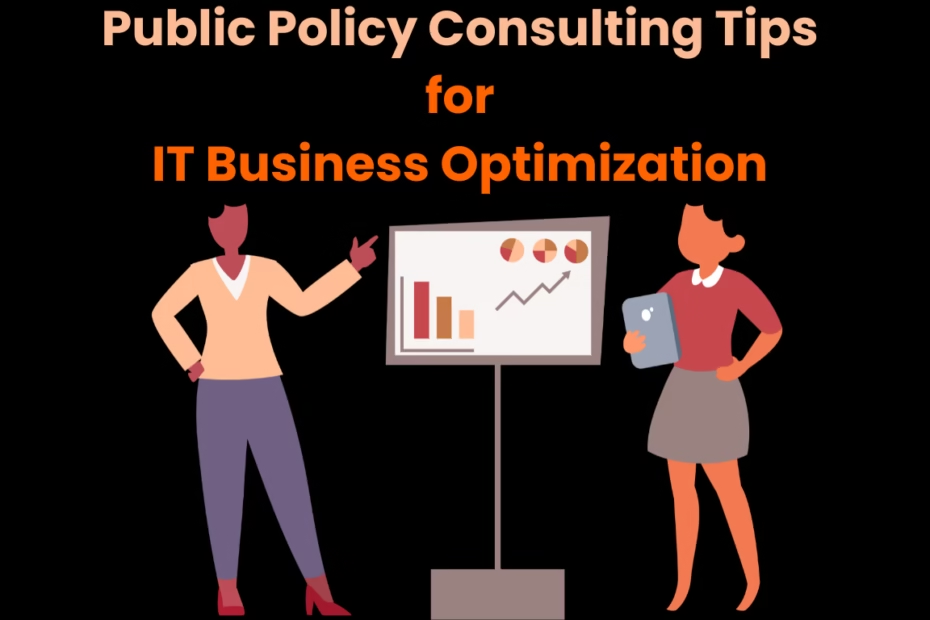Optimize IT Business with Public Policy Consulting Tips
Introduction
In today’s fast-changing digital world, public policy is very important for the growth of the IT sector. IT business optimization relies on knowing the rules and being able to change with new policies. Stakeholders, like IT companies, policymakers, and industry experts, need to work together. This teamwork will help create a space that encourages innovation and growth while protecting the public’s interests.
Understanding the Role of Public Policy in IT Business Optimization

Public policy includes many actions taken by the government. This involves laws, rules, and guidelines that can affect the IT industry in many ways. These policies aim to solve social issues, encourage economic growth, and protect national interests. They often play a role in areas like data privacy, cybersecurity, intellectual property rights, and competition in the market.
For IT companies, it is very important to understand public policy. Policy changes can mean new rules to follow, change how the market works, or create new chances for business. Engaging in public policy consulting can help companies stay informed and adapt to these changes effectively. If companies do not keep up with these changes, they could face fines, harm to their reputation, or lose their edge over competitors.
The impact of public policy on IT business strategies
The effect of public policy on IT business strategies is complex and significant. Policy reform can greatly affect how a company works, especially in areas like data privacy and security. Government agencies around the world are putting in place strict rules to safeguard sensitive information. This means that businesses need to change their IT systems and security measures. As a result, there is a rising need for teamwork and sharing information between the public and private sectors.
Public policy can also bring both chances and challenges to the market. For example, government actions that support cloud computing or encourage investments in clean energy can open new markets for IT firms. On the other hand, trade limits or rules on how data can move across borders can make it harder for companies to grow globally.
To handle risks and take advantage of opportunities, IT companies need to be proactive about public policy. They should keep an eye on policy changes, engage with lawmakers, and adjust their business plans to fit new rules. By understanding public policy’s effects, IT businesses can set themselves up for long-term growth and success in a world with more regulations.
Regulation of Data Privacy and Security
In today’s world, we create more data than ever. Because of this, data privacy is now a key topic in public policy. The federal government and global organizations have put rules in place to protect personal information. These rules also hold companies responsible for any data breaches. This situation affects IT businesses greatly since they need to focus on governance, follow the rules, and stay safe from cyber threats. A major example is the European Union’s General Data Protection Regulation (GDPR). This law sets a high standard for data protection across the globe. Following GDPR means that IT companies must change how they collect, store, handle, and share personal data. They need to be open about what they collect, ask for approval from users, and ensure data security.
To work within these new rules, IT companies should create strong data governance systems. They need to think carefully about risks and put in security measures. It is also vital to create a culture of data privacy in the workplace. Everyone in the organization needs to know their duties and follow the best practices. Companies like Commuserv understand the importance of these measures and work hard to help their clients stay compliant and secure in an ever-changing landscape of data privacy regulations.
Incentives for Research and Development
Public policy is very important in helping innovation grow in the IT sector. It does this by giving support for research and development (R&D). Many governments know that technology helps the economy and society. They have started different programs to boost investment in R&D.
One way they do this is by providing direct funding, grants, and tax breaks to companies that carry out advanced research. These supports can lower the financial risks of R&D. This makes it easier for IT companies to take a chance on new technologies and come up with fresh solutions.
Besides that, policy change can help create a supportive environment for R&D in other ways. Some of these ways include:
- Investing in STEM education and training.
- Encouraging teamwork between the public sector, schools, and private companies.
- Setting up rules that allow for new ideas and technologies to grow.
Global Trade and Market Access
The IT industry is closely linked to global trade and market access. This makes these factors very important for businesses in this field. Government rules on international trade, like tariffs, quotas, and trade agreements, can greatly affect how well an IT company competes worldwide.
Governments often use these ai trading rules to protect local businesses, bring in foreign investments, or meet other goals. However, these rules can also create challenges for foreign IT companies. They might make it harder for them to enter the market, or they can disadvantage local firms on the global stage.
To deal with this tricky situation, IT companies need to work with policymakers, industry groups, and other stakeholders. They should push for rules that encourage free and fair trade. This can mean joining trade missions, giving feedback on trade talks, and keeping up to date with changes in global trade rules.
Workforce Development and Talent Policies
The IT industry is changing fast. This change means there is a need for many skilled workers with specific abilities. To keep up, workforce development programs are important. They help ensure that there are qualified people ready to support the industry’s growth.
State governments have an important role in helping with workforce development. They achieve this through:
- Funding for job training and apprenticeships.
- Working with schools to make sure training fits what companies need.
- Offering rewards for businesses that train their workers.
In addition, rules about immigration, visas, and work permits can affect how many skilled workers are available. This is especially important for companies in places with a shortage of skills. Making rules that welcome and keep talented IT professionals is key to staying competitive in the global market.
Strategic Implementation of Public Policy Insights in IT Operations

To include public policy insights in IT operations, you need to take a smart and active approach. Start by setting up a strong system to monitor important policy changes, industry trends, and new rules. Do careful risk assessments to see how these changes might affect your business and find ways to respond or gain an advantage.
Then, create a culture of awareness and flexibility in your organization. Train all employees on the importance of public policy. Give them the knowledge they need to follow the new rules as they change.
Aligning IT business models with public policy changes
In a world where rules and regulations are changing quickly, IT businesses need to match their models to these public policy shifts. This is not just about following the rules. It is also a smart strategy. Companies need to look closely at how policy reform affects their work. They should find both risks and chances, then change their business models in response. To do this well, they must understand the current policies, predict changes, and adapt quickly.
Data privacy is a big part of this alignment. As more countries create stricter rules to protect personal information, IT companies must make sure they handle data the right way. This might mean investing in new privacy technologies, following rules that limit data collection, and getting clear permission from people before collecting or using their data.
Moreover, a company’s track record in managing data ethically and following the rules can help them stand out in the market. By showing they care about responsible data governance, IT businesses can build trust with their customers and improve their image. This can help position them as leaders in a world that cares about privacy.
Innovations in IT operations through public policy consulting
Public policy consulting can help drive new ideas in IT operations. Experts in public policy offer important insights into new rules, government projects, and funding sources. This helps businesses take advantage of new markets and technologies. Data analysis techniques can be used to look at policy-related data. This could help recognize trends, evaluate risks, and support smart decision-making.
For instance, knowing how the government invests in artificial intelligence (AI) or cybersecurity can aid IT companies in creating new products and services that meet these demands. Also, learning about policy trends in cloud computing or data localization can assist businesses in improving their services and data management.
By using public policy consulting and data analysis, IT companies can gain a lead over their competitors. They can predict market changes, create new solutions, and adjust their operations to match new rules. This forward-thinking approach allows businesses to stay ahead and take full advantage of how public policy can transform the IT world.
Ensuring compliance with evolving regulatory frameworks
Making sure to follow changing rules can be a big challenge for IT companies. Changes in public policy can bring new legal duties. These can include things like telling someone about a data breach, following security standards, or limits on sharing data across borders. Not following these rules can lead to big fines, damage to reputation, and legal problems.
To handle this tricky situation, IT companies need strong compliance programs. This means they should regularly check for risks, put in place the right security measures, and keep up to date with legal changes. They need legal help, either from their team or outside lawyers, to understand these complex rules and stay in compliance.
Also, spending on technology that helps automate tasks for compliance can make things easier. This can involve mapping data, managing consent, and auditing security. By being ready and careful about compliance, IT firms can lower risks and work confidently, even when rules keep changing.
Leveraging public policy for enhanced cybersecurity strategies
In today’s connected world, cybersecurity is not just up to individual companies. It is a shared issue that needs cooperation between the public and private sectors. The federal government is very important in setting cybersecurity standards. It also shares information about threats and helps coordinate responses to large cyber incidents. IT businesses must use these policy insights to improve their cybersecurity plans and safeguard their important assets.
One way to use public policy for better cybersecurity is to stay updated on government alerts and best practices. By knowing the changing threat environment and how the government plans to reduce risks, companies can better prepare for and protect against cyberattacks. Also, joining public-private partnerships and information-sharing projects can help access important threat information and improve collaboration on cybersecurity methods.
Additionally, IT businesses can push for policies that support cybersecurity innovation and spending. This means backing laws that promote research and development of new security tools and offering tax benefits for companies investing in cybersecurity training and systems. By working closely with policymakers and building a strong cybersecurity network, IT companies can help create a safer digital world.
Advancing data privacy standards through policy-driven IT governance
To improve data privacy standards, IT companies must take a strong and complete approach. This means they should include insights from public policy in their IT governance. Companies need to go beyond just following rules and make privacy a big part of everything they do. This starts from when they collect and process data to how they store and share it.
They need to set clear data governance policies. They should also use strong access controls and make sure their data practices meet legal rules and ethical standards. It’s crucial to review and update these policies regularly to keep up with changing regulations and to follow best practices.
IT companies must build a culture where privacy matters. Employees need to understand their duties and why protecting sensitive information is important. Training on data protection rules, how to handle data safely, and what to do in case of a problem can help employees play a key role in upholding data privacy standards.
Read More: 5 Proven Strategies to Scale Your SaaS Business
Conclusion
In summary, using public policy ideas in IT business operations is key to staying ahead in today’s changing world. Connecting strategies with data privacy rules, supporting innovation through R&D help, and improving cybersecurity can help businesses do better. Success stories from leaders like One and Commuserv show the clear benefits of using public policy advice. Using these insights helps companies meet requirements and grow strategically. Stay informed, flexible, and active in using public policy strategies to improve your IT work. Discover the many possibilities that come when public policy and IT work well together.
Frequently Asked Questions
How can public policy consulting improve IT business operations?
Public policy consulting helps improve IT business operations. It gives insights for better strategic planning. This results in improved compliance and encourages informed innovation. It also provides a competitive edge by keeping up with current and future regulations.
What are some success stories of IT companies like 1 and One and Commuserv in utilizing public policy insights?
Many IT companies use public policy insights to predict changes in rules. They work to improve their data systems and stay ahead of the competition. Although we do not have success stories from 1 and One or Commuserv, it is clear that these strategies can help companies grow.
In what ways can public policy influence IT infrastructure and security measures?
Public policy plays a big role in IT infrastructure and security. It does this through laws that require companies to follow regulations. This focus on policy creates rules for protecting data, securing networks, and ensuring reliable connections. It also influences how businesses invest in and develop their IT systems.
What are the benefits of aligning IT business operations with public policy?
Aligning IT business operations with public policy is good for building a strong position. It helps you stay ahead by following the rules, reducing legal problems, and improving your brand’s image through responsible governance.

